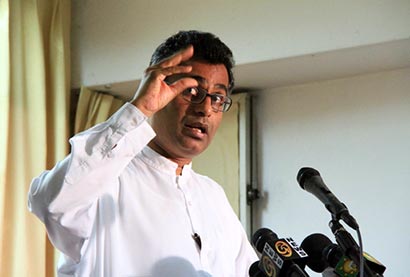Electricity and fuel tariff unrealistic: Champika

Electricity and fuel tariffs in Sri Lanka are not realistic and consumers have a right to know how these tariffs came about, Technology and Research Minister Patali Champika Ranawaka said yesterday.
At Tuesday’s ceremony at the Sri Lanka Foundation where his controversial book ‘Power and Power’ that contains so far undisclosed and highly sensitive information on the power and energy sector in Sri Lanka, he said Sri Lanka needed an objective and transparent pricing formula benefiting both the consumer and the industry.
The minister said the entire energy sector – the import of fuel, refining, distribution, power generation, power transmission, purchase of power from the private power providers and levying of taxes on the use of electricity was manipulated and controlled by a power and energy mafia that comprises four or five officials. He said they were so powerful that even the Government was helpless to stop them.
“The consumer has the right to ask the electricity bills are calculated. Why they pay this amount of tax and why their monthly bill is not competitive,” the minister said. “This is white collar terrorism and has to be defeated sooner than later because this cartel of criminals continues to defraud the unsuspecting consumer and the government of billions of rupees. We have in our midst many more terrorists like Prabhakaran.”
The minister raised doubts on how a litre of petrol was being sold at Rs.162 when a litre costs only Rs.97.17 to import. He said the difference between the price to import and sell petrol was Rs.15 billion annually but consumers are forced to pay much more than the actual price of fuel even after taxes on fuel.
‘That is why I emphasize the need to work out a pricing formula that reflects the correct data on the purchase and selling prices, taxes and other levies. Prices indicated in the monthly bill do not paint the true picture,” the minister said. “Oil is thicker than blood. Sri Lanka’s economy was developed by threefold in five years after 1977. But the prices of goods increased by leaps and bounds and the country’s economy leap-frogged in a short period under the open economy backed by the low cost of fuel, labour, slack environment policies and easily available loans,” the minister said.
He said a powerful public campaign was needed to correct the wrong and unrealistic situation in the power and energy sectors.
The minister said fossil fuel would cease to exist in four or five decades and the only solution was to turn to renewable or alternative energy.
“Understanding the impending danger, US and Europe had drastically reduced the dependency on petroleum products. All developed countries are in a race to develop solar power, wind power and other alternative energy sources and that is why Sri Lanka must free itself of this power and energy trap and develop recyclable energy for the larger benefit of the people and the country,” he said. Prof. Gunapala Nanayakkara delivered the keynote address.
(Daily Mirror)

Latest Headlines in Sri Lanka
- CID raids Kataragama Basnayake Nilame’s house in search of IGP Deshabandu March 10, 2025
- Sri Lanka’s remittance inflows continue to grow in February 2025 March 10, 2025
- IGP Deshabandu Tennakoon seeks court order to block arrest March 10, 2025
- Chamal Rajapaksa to contest Local Government Elections under SLPP March 10, 2025
- Aloe Blacc arrives in Sri Lanka to explore investment opportunities March 10, 2025


